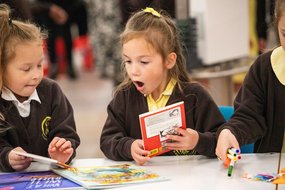
Studies suggest that book ownership can have a positive impact on outcomes ranging from reading attainment (Lindorff et al., 2023) and academic achievement (Evans et al., 2010) to lifetime earnings (Brunello et al., 2015).
Our annual surveys of children and young people aged 5 to 18 have consistently found that more children and young people who have books of their own at home enjoy reading and choose to read daily in their free time (see, e.g., Picton & Clark, 2023). In 2024, we also looked at links between book ownership and reading skill.
Key findings
- In 2024, 9 in 10 (90.2%) children and young people aged 5 to 18 told us that they had a book of their own at home, meaning that 1 in 10 (9.8%) did not.
Differences in book ownership by age group and receipt of free school meals
- Fewer than 9 in 10 children aged 5 to 8 (86.7%) said they had a book of their own, meaning that 1 in 8 (13.3%) did not. However, this represents an increase of 5.9-percentage-points from 2023 (when 80.8% reported having a book) and is the highest percentage of this age group saying they had a book since we first started asking this age group this question in 2019.
- More than 9 in 10 (90.9%) children and young people aged 8 to 18 said they had a book of their own in 2024, meaning that 1 in 11 (9.1%) did not. This is the lowest percentage of this age group saying they had a book since 2016.
- As in previous years, fewer children and young people who received free school meals (FSMs) said they had a book of their own compared with their peers who did not receive FSMs (87.6% vs 92.0%). This means 1 in 8 (12.4%) of those who received FSMs did not have a book compared with 1 in 13 (8.0%) of their peers.
Regional differences in book ownership
- There were slight differences in book ownership depending on where in England children and young people went to school, with most reporting having a book of their own in London (93.4%) and fewest in the North West (88.3%)
- Ranking book ownership by English region over the last decade reveals a persistent north-south divide, with regions in the south of the country (the East of England, London, South East and South West) consistently in the top three places and those in the north (the North East, the North West and Yorkshire and the Humber) most frequently in the bottom three.
Why does book ownership matter?
Findings from our survey showed that book ownership was linked with reading enjoyment, frequency and skill:
- More than three times as many children and young people aged 8 to 18 who had a book of their own at home said they read daily (23.1% vs 7.0%) and almost four times as many told us that they enjoyed reading compared with those without a book (38.7% vs 10.1%)
- Compared with their peers who said that they had a book of their own, more children and young people who told us that they didn’t have a book read below the average (16.7% vs. 7.3%) and fewer read above the average (10.6% vs. 22.5%).
Recognising the links between book ownership and broader life outcomes, increasing book ownership may be seen as a matter of social justice. This report aims to provide evidence and insights for all those seeking to ensure that children and young people have access to the resources they need to develop the literacy skills to thrive in later life.